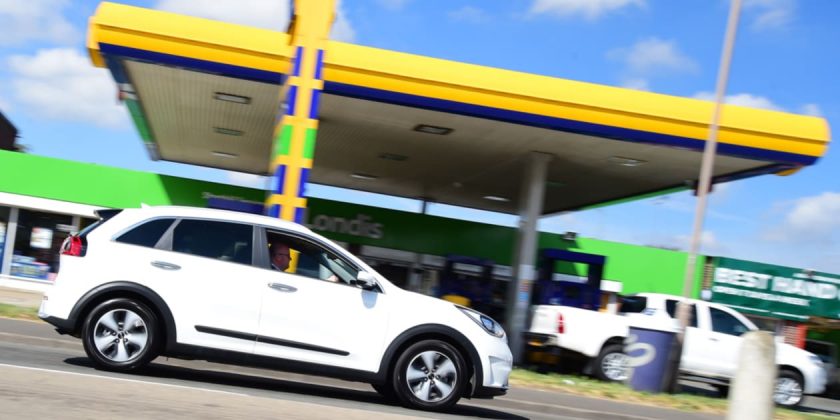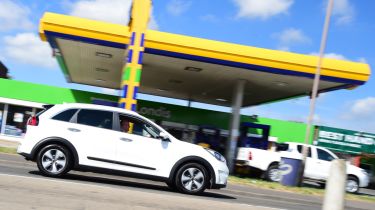The average UK price of diesel has breached 155p per litre for the first time, while petrol is above 151p per litre
The average pump price of diesel in the UK has now breached the 155p per litre barrier, and petrol has risen further, too.
Diesel now costs an average of 155.23p per litre at UK pumps, with petrol at 151.67p per litre, according to the latest RAC Fuel Watch figures. Furthermore, more fuel price rises could be on the way.
Corn-based ethanol biofuel is less eco-friendly than petrol
RAC fuel spokesman Simon Williams explained: “The sudden $10 jump in the oil price on Tuesday [1 March] to $113 a barrel is likely to take the average price of petrol towards 155p a litre and diesel to 160p, particularly as it’s looking like this price isn’t just a market blip caused by the US and allies deciding to dip into the strategic oil reserve. If oil does stay at this level, the journey to an average unleaded price of 155p may be far too quick.”
Why is the Ukraine conflict affecting fuel prices?
Russia is one of the world’s largest producers of oil and gas, so any disruptions to its production processes has a global impact.
With Russia having launched a full-scale invasion of Ukraine and facing international sanctions, there’s potential for significant disruption to supplies. Russia produces 4.5 million barrels of oil each day, and only Saudi Arabia produces more.
The sanctions levied against Russia so far have targeted banks and oligarchs rather than the country’s energy sector, but factors such as Germany’s postponement of the Nord Stream 2 gas pipeline will have an effect on the energy market overall. Russia also has the ability to reduce oil exports to Europe in a tit-for-tat response to economic sanctions, and experts suggest Saudi Arabian oil fields could struggle to increase production sufficiently to counter such measures.
“Opec, the oil producers’ cartel, is already struggling to meet its output targets as demand for crude rebounds following the easing of lockdown restrictions. This has pushed up prices, with analysts warning there is limited capacity to increase supplies if flows from Russia are affected by sanctions,” the Financial Times newspaper has reported.
What makes up the price of UK fuel?
The price of fuel can be divided into three sections; the taxes imposed by the Government, the costs of drilling, refining and transporting, and the profit margins for the fuel companies.
For petrol, diesel and bioethanols, the Government gets around 65 per cent of the overall cost through fuel duty and value added tax (VAT). The fuel duty represents the fixed price of fuel – it stays the same regardless how much overall oil prices fluctuate. Currently, the Treasury adds 57.95 pence to each litre of fuel through fuel duty, and another 20 per cent through VAT. How much you pay in VAT depends on how much fuel you purchase.
The second biggest chunk comes from the wholesale costs of the fuel itself. The wholesale cost is a combination of currency exchange rates, global oil prices, and even domestic supply and demand.
New 450kW EV charger from BMW and Porsche is as fast as filling up with petrol
Finally, the smallest share of what motorists have to pay for fuel comes from the filling stations themselves. A typical fuel station profits around 2p-5p per litre, but tough competition can drive this down further. Supermarkets increasingly use fuel prices as a loss leader to tempt customers in.
Why is supermarket fuel cheaper than an independent forecourt?
Supermarket forecourts usually offer the cheapest fuel prices and this is because of the market power supermarkets hold. Companies like Asda, Tesco, Sainsbury’s and Morrisons are all in competition with one another, so they keep fuel prices as low as possible hoping that when motorists come to fill their tank, they might do their weekly grocery shopping, too.
There are persistent rumours that supermarket fuel contains fewer additives and is of lesser quality than fuel from traditional forecourts, but there’s little hard evidence of this. All fuel sold in the UK has to abide by the standards set in the Motor Fuel Regulation.
Why is fuel so expensive on motorways?
Motorway fuel stations argue the reason their prices are higher is that many of them are open 24 hours a day and offer more services than a regular forecourt. Motorway fuel stations also pay high rent prices for the buildings they operate.
In more remote areas, fuel is often more expensive because of the higher transport and supply costs, but according to RAC fuel spokesman Simon Williams, this doesn’t apply to motorway stations: “We can see no reason why motorway fuel should be so much more expensive. In fact, arguably it is much easier from a delivery point of view than it is getting fuel to urban filling stations.”
Why is diesel more expensive than petrol?
Although diesel and petrol are taxed the same by the Treasury, historically diesel has been more expensive than petrol, as domestic refineries have struggled to meet demand. This has forced the UK to import diesel from other countries at a greater rate than petrol. In addition, diesel prices are pushed up by the cost of the additives that go into the fuel.
Best diesel cars 2022
Furthermore, the gap between UK petrol and diesel prices widens during the winter. The end of the US “driving season” means retailers have a surplus of petrol they can’t export, so they sell it here at a lower price. Diesel demand, meanwhile, increases across continental Europe, where the fuel is commonly used in heating oil.
However, the influx of cheap diesel from countries like Saudi Arabia has turned the tide, swinging diesel wholesale prices closer to that of petrol, and bringing the pump price down with it.
What’s your view on fuel prices in the UK? Do we pay too much for our petrol and diesel? What would you do about it? Join the debate in our comments section below…
Source: Read Full Article



 Corn-based ethanol biofuel is less eco-friendly than petrol
Corn-based ethanol biofuel is less eco-friendly than petrol New 450kW EV charger from BMW and Porsche is as fast as filling up with petrol
New 450kW EV charger from BMW and Porsche is as fast as filling up with petrol Best diesel cars 2022
Best diesel cars 2022